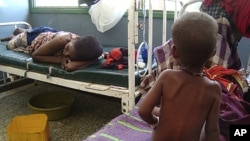The United Nations says it expects famine to spread to all regions of southern Somalia within the coming weeks. This grim assessment comes barely two weeks after the United Nations officially declared famine in two regions of southern Somalia amid the worst drought to hit the Horn of Africa in 60 years.
United Nations aid agencies are working furiously to try to provide food and other essential relief to drought victims in Somalia. But, they say humanitarian assistance is severely hampered by fighting in the capital Mogadishu between pro-government forces and the militant group al-Shabab.
Last week, African Union peacekeepers launched an offensive against al-Shabab, which they say is aimed at making it easier for relief groups to deliver aid.
Despite the ongoing fighting, U.N. refugee agency (UNHCR) spokeswoman Fatoumata Lejeune-Kaba says the drought is so critical that desperate people continue to flee into the war-ravaged capital in search of food. She warns the famine in Somalia is likely to grow in size and severity.
Last month alone, she says 27,000 people fled into Mogadishu from the heavily drought-affected areas of Bay, Bakool and Lower Shabelle.
"According to the latest data from our food security partners, food security is expected to deteriorate over the coming months," Lejeune-Kaba noted. "By August/September, all regions of southern Somalia are likely to be facing famine, according to the Food Security and Nutrition Analysis Unit and it is expected that the influx of IDPs [Internally Displaced People] in the city will continue as a result."
Lejeune-Kaba tells VOA the determination of a famine is not done lightly. It is based on several strict measures.
"We are getting our information from the Food Security and Nutrition Analysis Unit, which is basing it on the current levels of malnutrition, mortality rate, the combination of increasing food prices and harsh dry season," added Lejeune-Kaba. "They established that the food security can only deteriorate over the coming months because of all these factors."
A simple shortage of food is not enough to qualify as a famine. Before a famine can be declared, the United Nations says 20 percent of the population must have fewer than 2,100 kilocalories of food available per day.
More than 30 percent of the children must be acutely malnourished. Finally, two deaths per day in every 10,000 people or four deaths per day in every 10,000 children must be caused by a lack of food.
U.N. officials say some areas of southern Somalia are exceeding these measures.
UN: Famine Likely to Spread Across Southern Somalia
- By Lisa Schlein




